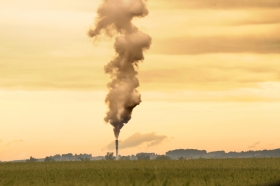Have Carbon Emissions Passed an Important Threshold?
From: ClickGreen Staff,
ClickGreen
Published November 5, 2012 06:33 AM

The annual rate of reduction of carbon emissions per unit of GDP needed to limit global warming to 2ºC, has passed a critical threshold according to new analysis from PwC.
And the report's author warn the rate of reduction now required has
never been achieved before and add: "This isn't about shock tactics,
it's simple maths."
The analysis in the PwC Low Carbon Economy Index, measuring developed
and emerging economies progress towards reducing emissions linked to
economic output. It demonstrates that at current rates of emissions
growth at least 6ºC degrees of warming could be possible by the end of
the century.
The report shows that while the increase in emissions intensity in 2010 has been reversed, with only a 0.7% reduction globally in 2011, it’s a fraction what is required against the international commitment to limit global warming to 2ºC.
To limit global warming to 2ºC would now mean reducing global carbon intensity by an average of 5.1% a year, a performance never achieved since 1950, when these records began.
The report warns that "governments and businesses can no longer assume that a 2ºC warming world is the default scenario." It adds that any investments in long term assets or infrastructure, particularly in coastal or low-lying regions need to address far more pessimistic scenarios.
With less than four weeks to the UN Climate Summit in Doha, the
analysis illustrates the scale of the challenge facing negotiations. The
issue is further complicated by a slow market recovery in developed
nations, but sustained growth in E7 economies which could lock economic
growth into high carbon assets.
Emerging markets’ previous trends on carbon emissions reductions linked
to growth and productivity have stalled, and their total emissions grew
by 7.4%. By contrast, the UK, France and Germany achieved record levels
of annual carbon emissions intensity reductions, but were helped on by
milder winters.
Jonathan Grant, director, sustainability and climate change, PwC said:
“The risk to business is that it faces more unpredictable and extreme
weather, and disruptions to market and supply chains. Resilience will
become a watch word in the boardroom - to policy responses as well as to
the climate.
“More radical and disruptive policy reactions in the medium term could
lead to high carbon assets being stranded.
“The new reality is a much more challenging future in terms of planning,
financing and predictability. Even doubling our current annual rates of
decarbonisation globally every year to 2050, would still lead to 6oC,
making governments’ ambitions to limit warming to 2oC appear highly
unrealistic.”
The pace of reducing global carbon intensity has been slow despite
growing international focus on climate change. The financial crisis has
dampened progress further, with carbon intensity falling less than 1% in
the four years since it began.
Leo Johnson, partner, PwC said: “While we’ve reversed the increase in
emissions intensity reported last year, we’re still seeing results that
are simply too little too late. We’ve now got to achieve, for the next
39 years running, a target we’ve never achieved before.
“This isn’t about shock tactics, it’s simple maths. We’re heading into
uncharted territory for the scale of transformation and technical
innovations required. Whatever the scenario, or the response, business
as usual is not an option.”
Jonathan Grant, director, sustainability and climate change, PwC said:
“The challenge now is to implement gigatonne scale reductions across the
economy, in power generation, energy efficiency, transport and industry,
as well as REDD+ in forested nations.”
Examining the role of shale gas, PwC’s report suggests that at current
rates of consumption, replacing 10% of global oil and coal consumption
with gas could deliver emissions savings of around 3% a year (1gt C02e
per annum).
However the report warns that while it may “buy some time”, it reduces
the incentive for investment in lower carbon technologies such as
nuclear and renewables, and could lock in emerging economies with high
energy demand to a dependence on fossil fuels.
Factory smoke stack via Shutterstock.
Powered by
Click Creative
© All Rights Reserved.